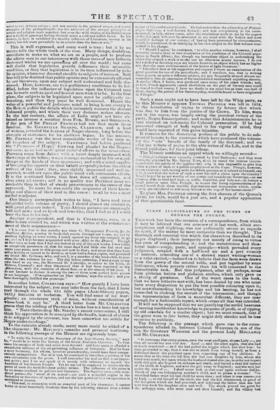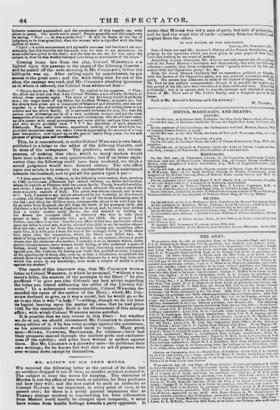DIARY ILLUSTRATIVE OF THE TIMES OP GEORGE THE FOURTH.
THIS work has been the occasion of a correspondence, from which it may be inferred that our annonee of it last week, albeit con- temptuous and slighting, was not sufficiently severe as regards its spirit, if the matter be more authentic than we thought. The thorough and essential vice which the characters described in its pages displayed ; their incapacity not merely of rising to virtue but even of comprehending it ; and the meretricious and thea- trical taste—rouge, paste, and spangle—which pervaded every judgment, coupled with a half-bred air and a pert vivacity of manner, reminding one of a shrewd smart waiting-woman or a valet excited,—induced us to believe that the facts were drawn from the gossip of the second table, and put together by some litterateur, whose poverty rather than his will consented to the discreditable task. But this judgment, after all perhaps, arose from plebeian habits and plebeian studies, which only gave us a theory of greatness. One of the worst cases in the book, that we have hitherto met with, has been denied by one who must have every disposition to put the best possible colouring upon it; but notwithstanding his knowledge and his leaning, be has not succeeded in shaking the morale of the transaction; and though the representation of facts is somewhat different, they are near enough for a fashionable report, which seems all that was intended. It will not be supposed that we are justifying the sordid baseness of turning confidential knowledge to purposes of profit, or of ripping up old scandals for a similar object ; but we must remark, that if the great were to live better, they might defy slander and be less sensitive to publicity. The following is the passage which gave rise to the corre- spondence alluded to, between Colonel WEBSTER (a son of the late Sir GODFREY Wittman and the present Lady HOLLAND) and Mr.COLBURIN.
" It is strange that every person, even the most profligate, abuses Lady —, yet they all receive her and visit her. Lord — said the other night, that *be had as much murdered — as if she had pulled the trigger which bail shut him ; he their proceeded to say, that it was not so much from losing herself, as from a diabolical deceit she practised upon him respecting one of her. children. It Weill, that at the time she left him she had rare daughter by hnn, whom she loved very much, but upon whom the husband dusted also; so, in order not to part with this girl, she feigned its sickness and death, and buried a dead kid instead of the child, at Leghorn, and sent the girl away to England ; and she sent her under the care of —. I shall never look at that man again without dislike. Think of any one kidnapping another's child, and to please a woman! 't'he wretched father wept his lost child for some time ; and when it wu cooven.ent to Lady -_ to rid herself of the child, she had the kid disinterred, in proof of the deception which she had practised, and informed the father that she had sent him back his daughter alive and well. The shock proved too great for the unhappy man, who went mad and shot himself; and the villany had bitherto remained unpunished, and the perpetrator of this tragedy can walk about in pines. Oh, surely not in peace! People generally end this tragic tale by saying, " Poor —, he was a great fool." It will he better at the day of jedgrnent to be that great fool, than the woman who is dignified with the false epithet of clever. "Lard noble countenance and agreeable manners had fascinated me eon. Rid•rably, but this horrible tale has gunk him fur ever in my estimation he must have been privy to the deed ; and the best we can say for him upon the subject is, that he was weakly betrayed into being an accomplice of the crime."
Coming home late from the play, Colonel WEIMER'S eu, lighted upon this passage in the pages of the Literary Gazette ; and he posted off the next morning to Mr. CoLnuives, before the bibliopole was up. After calling again by appointment, he got access to the great man ; and the work being sent fur out of the shop, the passage was read, and Mr. CoLBURN pleading ignorance as to whom it referred, the Colonel thus addressed him- " Do you know me, Mr. Colburn?" Ile replied in the negative. " Then, Sir, allow me totell you that I am Colonel Webster, a son of Lady Holland, to whom these remarks apply. The story of the kid being buried is perfectly true ; the tragic death of my father, Sir Godfrey Webster, is equally so ; but the details here given are a compound of falsehood and absurdity, and are put togetker in a way calculated to give the deepest pain and unhappiness to my mother and her whole family. It is extremely fortunate fur you, Sir, that the person now addressing you is of • very moderate temper, and not the most susceptible of three other near relations and connexions, who would have taken up this matte: with equal promptness, and more ability, perhaps, than myself, and who would probably have • • • • &c. the editor of such shameful falsehood.. You need, however, apprehend nothing of that kind from me, provided immediate steps are taken towards suppressing the account of a long past transaction, now ripped up at the end of nearly forty years, for the sole purpose of giving psis sad mortileation."
This, be it remembered, is under Colonel Wansraa's own hand, published in a letter to tho editor of the Literary Gazette, and in most of the newspapers. The prudence, under any circum- stances, of making that clear, which to many readers would have been unknown, is very questionable ; but if no better expla- nation than the following could have been rendered, we think a sound judgment would have dictated silence. The sole effect upon our minds is to remove the sentimental feeling entertained towards the husband, and to put all the parties upon a par- " I then stated to Mr. Colburn, in the following conversation, that, previous to 1796, unfortunate differences had existed between my father and mother, whom he had left at Florence with her young family. Young, beautiful,wealthy, and clever, I leave you, Sir, to guess how much admired she was in one of the most seductive capitals of Italy. The result WAS almost natural, and is soon 141'1 Left, I lament to say almost abandoned by her husband, in this distant country, she threw herself into She arose of one of the most fascinating men of the day ; and when her children were, consequently, about to be torn from her by an order from England, she did feign the death of her youngest child, she diddirect a kid to be buried at Leghorn in its stead, and, by every fond artifice that a tender mother could devise, she did succeed in holding to her bosom her youngest child. A discovery was sure to take place sooner or later. It eventually did ; and the child, the present Lady Pellew, was taken from her : but the only effect of this very pardonable offence upon my father's mind was, that he allowed this child to see its mother oftener than the rest; and so far from this transaction having any immediate effect upon him, it is with pain I state the fact of his unhappy death in ISO°, about four years after the transaction, which the Diary says killed him. In- stead of being ashamed of a proceeding which, in my opinion, throws a great charm over the character of a mother, 1 consider it as an example which, under similar circumstances, every woman worth loving, or who possessed a grain of feeling, would have followed ; and so far from cherishing much resentment against you, Mr. Colburn, for having put forth this garbled account, I rejoice at the opportunity of being able, even on so base a foundation, to establish the simple facts of an occurrence which has lain dormant for a very long time, and which has never, to my knowledge, been made a subject of attack in print against my mother," The result of this interview was, that Mr. COLBURN wrote a letter to Colonel WEBSTER, in which he promised, " without a mo- ment's delay, the erasure of the passages in the Diary :" he also proffered " to give you (the Colonel) my best advice regarding the letter you intend addressing the editor of the Literary Ga- zette." In a subsequent communication, Colonel WEBSTER de- manded the name of the author of the Diary ; which Mr. Col.- Zunis declined to give, as it was a secret, but lie would go so far as to say that it was "a lady / "—adding, though we do not trace its logical bearing upon the matter at issue, that he had given 1001. for the manuscript. Such is the denouement of this strange affair; with which Colonel WEBSTER seems satisfied.
It is possible that we may return to this Diary : but whether we do or not, we should recommend Mr. COLBURN to circulate a cheap edition of it, if he has some grudge against the aristocracy, as his systematic conduct would seem to imply. Many great men—Buaxa, CANNING. BROUGHAM, for instance—have had their prospects marred through the insolent pride and exclusive- ness of the nobility; and some have written or spoken against them. But Mr. COLBURN is a shrewder man—he publishes their own writings; for he knows full well that no set of persons were ever written down except by themselves.



























 Previous page
Previous page